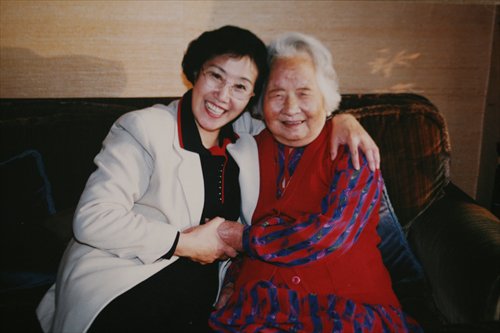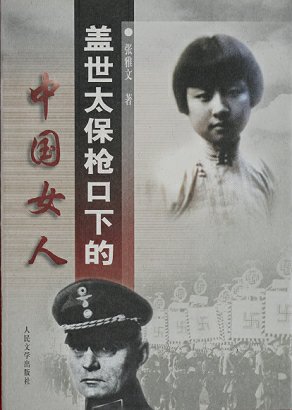Remembering a hero
Zhang Yawen, author of A Chinese Woman at Gestapo Gunpoint

Zhang Yawen (left) and Qian Xiuling Photo: Courtesy of Zhang Yawen
Zhang Yawen, 71, has recently published another anti-war book, which she believes is a remedy and extension to her 2002 novel A Chinese Woman at Gestapo Gunpoint.
Gestapo is a dramatization of the life of Chinese-Belgian woman Qian Xiuling, who saved more than 100 Belgians from the Nazis with the help of German general Alexander von Falkenhausen. The book won Zhang great fame in China and abroad, and Qian was later dubbed the "female Schindler of China."
On June 24, the English edition of the novel was selected as a gift by Chinese President Xi Jinping for the visiting King Philippe of Belgium, which once again thrust Zhang into the limelight.
The publisher immediately called her to request a second edition.
Zhang said that she has regrets about A Chinese Woman at Gestapo Gunpoint. "The names in the novel were made up. I wrote the telescript first, which required more conflicts. I rushed out the book within four months, there were many defects."
Her new book, Play Games with Devils: Lessons for the Future, is a nonfiction work based on interviews and materials she collected last year. It mainly talks about people who helped save many civilians from being killed by the Nazis and Japanese during World War II, including Qian Xiuling, Germans Falkenhausen and John Rabe, Sindberg from Denmark and Verda Majo from Japan.

The cover of the original Chinese edition of A Chinese Woman at Gestapo Gunpoint Photo: Courtesy of Zhang Yawen
A history of conflict
Her first interview with Qian took place 16 years ago. One day in May 1999, Zhang received a call from a friend who told her about a report he had read in the Global Times about a Chinese woman who was awarded the "Hero of the State" medal for saving a number of Belgians from the Nazis with the help of a German general. When the general was put on trial after the war ended, she defended him.
She immediately decided to go to Belgium to interview the woman and write a book on her. After months of trying to obtain an invitation letter and financial backing, she finally obtained a visa on October 26 that year.
Without knowing any foreign language, and armed only with a camera, voice recorder, pen and notebook, she set off for Europe. Days later, after arriving in Brussels, she finally knocked on the door of Qian's home.
Qian came to Belgium in 1929 at the age of 16 from her birthplace in Yixing, Jiangsu Province. After finishing her doctorate in chemistry in the country, she married a Russian medical graduate in 1935.
"She is very elegant, modest, kind and well-educated," said Zhang, recalling her first impression of Qian.
Nevertheless, unlike the warm response that the writers asking for an interview would usually receive, Qian's family were puzzled about Zhang's intentions.
Qian's eldest son questioned the fact that she had flown by herself all the way from China to write about his mother, who had just done something that many others had. Even when she explained that his mother's humanitarian spirit was admirable and she was the pride of China and Belgium, he still had his doubts.
Zhang's enthusiasm was not dampened though. During her 27-day stay, she spoke with Qian and the children of the people who were saved by Qian's efforts, read letters and history books and visited places related to Qian and the war.
As she dug deeper, she became more excited, as she believed Qian's story was even more touching than the one portrayed in the 1993 film Schindler's List. She returned and set about taking the story to the screen.
In March 2002, a 16-episode TV version of called A Chinese Woman at Gestapo Gunpoint hit Chinese screens. But the finished drama had been heavily rewritten, and Zhang claimed she was kept in the dark. She then began a seven-year legal battle against copyright infringement, which she eventually won.
The drama received a great deal of criticism, and Zhang was also angry about the revisions to the storyline. "The drama glamorizes the subject too much. It also added subplots involving prostitution and rape, which Belgian audiences were disgusted by," Zhang said.
According to one media interview with Qian's great-grand niece, Qian's family was also dissatisfied with the TV show. Qian had managed to connect with Falkenhausen thanks to her elder cousin Qian Zhuolun, a former Kuomintang Lieutenant General who was a good friend of Falkenhausen's during his time in China, something the TV show failed to mention.
Regret and rebirth
On top of the strain of the copyright disputes, Zhang was diagnosed with serious heart disease, forcing her to undergo major surgery in 2004. In the face of death, she cherished the days left to her in which she could write. In 2007, her autobiography Cry For Life, her greatest source of pride so far, was published.
"It is a documentary work of the greater part of my life. Some say it's also a book reflecting the country's transitions in the past 60 years," she said. The book was well received among readers and won several literary awards, including the Lu Xun Literary Prize in 2010.
Zhang was born to a poor family in a remote mountain region in Kaiyuan, Northeast China's Liaoning Province in 1944. To study, she had to walk 10 kilometers to school every day.
In 1959, she was selected to become a speed skater by a sports team but retired four years later due to injury. Zhang said the four-year experience sharpened her perseverance and ability to endure hardship.
She then started to study in preparation for the national exams to enter college. But just as she was ready, the Cultural Revolution (1966-76) began and the exams were canceled.
In 1977, when the exam system resumed, she was already 33 and had two children. "That era deprived me of the chance to go to college. I was rather upset at that time," Zhang said.
One day in 1979, while lamenting her regrets, her husband, also a former athlete, mentioned that they could write a novel in which the characters could win a championship for them. That conversation inspired her to write.
Her first work was a 3,000-word story about how a woman managed her responsibilities to her family and her job after the reform and opening up policy started. She took the manuscript to a newspaper, whose editor published it the next day, igniting her enthusiasm for writing.
She became fascinated with ancient poetry and started reading literary masterpieces to broaden her cultural horizons.
In 1991, she set off to Russia and interviewed Chinese traders along the way, selling leather jackets to cover her traveling expenses.
So far, she has traveled around 10 countries and written works that add up to 8 million words.